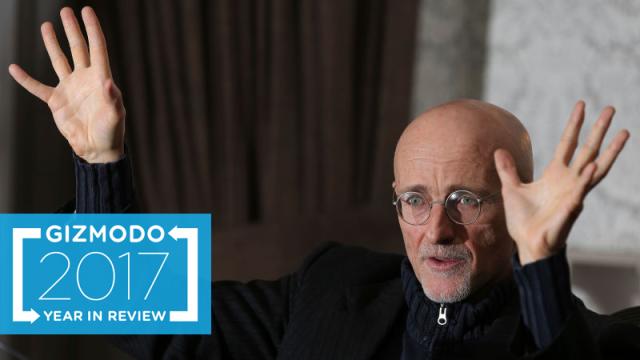It’s really not that hard to write a science news story, I promise. Some new scientific results come out, you talk to a scientist on the phone and ask them what they did, then you ask a few other people who know about the research if the results made sense. It’s a lot like, well, any other reporting.
But there’s just something about science news that makes people really, really bad at covering it. Reporters blow single papers out of proportion, publish their own assumptions that the research doesn’t actually support, or plop a super-speculative headline on top of preliminary results. Then there’s the hype cycle, where writers might opt to cover overblown, one-sided university press releases instead of the actual science.
2017 rewarded us with some amazing scientific discoveries, but also some really awful coverage of basic science. Some of this came from tabloid publications you’d expect to fearmonger or pander to conspiracy theorists. But other bad reporting appeared in otherwise respectable and conscientious publications. Here are the worst offenders, with apologies.
A pretend planet doesn’t strike Earth
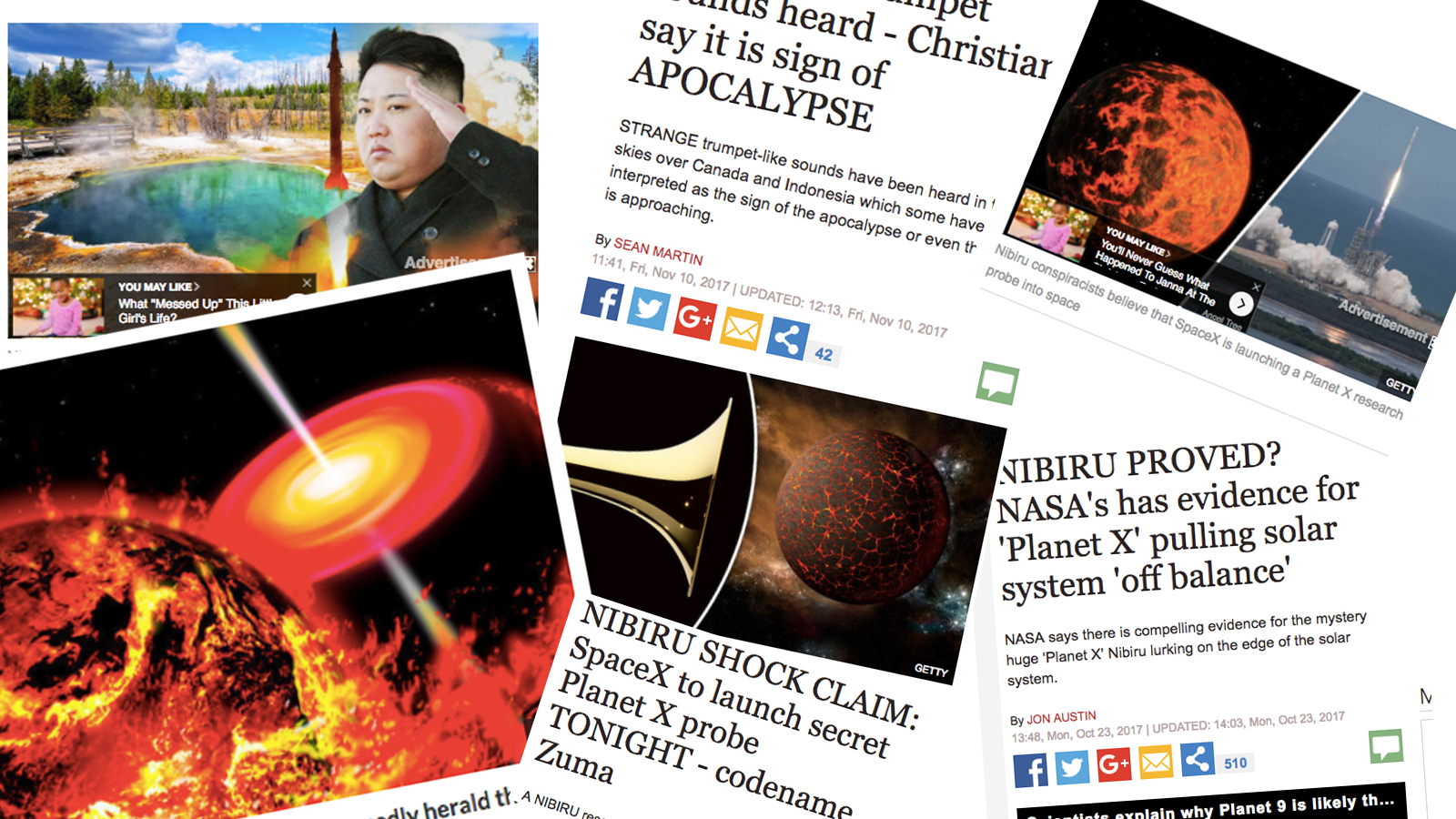
Image: Screenshots/Ryan F. Mandelbaum
Conspiracy and end-of-the-world theories are the bread and butter of some journalists at red-top tabloids in the United Kingdom. But some of these articles made it to the top of Google News’ science section, causing one conspiracy theory to spread far beyond entertainment: Nibiru.
Nibiru is a planet, or, er, maybe an entire solar system, that conspiracy theorists claim would have struck Earth in September, or October, or November, or December (the date changes) and bring armageddon. It’s not true of course, but recent legitimate speculation about a possible ninth planet, combined with the fact that many bad things really are happening on Earth, may have increased people’s concern.
[referenced url=”https://gizmodo.com.au/2017/09/stop-wasting-my-time-with-this-stupid-planet-x-doomsday-conspiracy-theory-bullshit/” thumb=”https://i.kinja-img.com/gawker-media/image/upload/t_ku-large/gndbmgry0lngb3nqmypt.jpg” title=”Stop Wasting My Time With This Stupid Planet X Doomsday Conspiracy Theory Bullshit” excerpt=”Image. NASA/JPL-Caltech Holy shit, stop, please stop. When a crazy person says something crazy in real life, we ignore them. But for some reason on the internet we decide that every crazy person is worth listening to, news outlets with large audiences write about their fever dreams, and less crazy people suddenly get concerned because now every news outlet is the National Enquirer spewing hot garbage about some made-up astronomy bolstered by someone’s ridiculous fake religious enlightenment.”]
The theory has been around for decades, but the 2017 resurgence led to the publication of debunkers on general media sites like The Washington Post. Fox News (of course) wrote an especially bad Nibiru deep dive. None of these stories were factually inaccurate, per se, since they usually relied heavily on quotes from conspiracy theorists. Yes, it is true that the conspiracy theorist said that the world is ending. But often times, these stories included only one sentence from scientists saying that there’s very clearly no Nibiru threat.
Scientists make a model of Antarctic rock
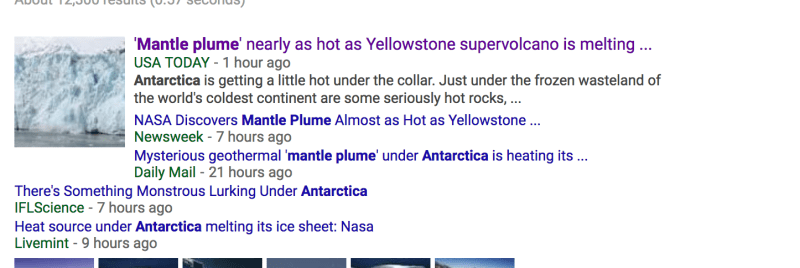
Some of the year’s worst-reported stories were just plain wrong. News outlets reported last month that a “mantle plume” (or in one case, a monster) was brewing beneath Antarctica, “as hot as Yellowstone.” That was not really the case.
Rather than find a mantle plume, scientists built models of what might have happened if there really was a section of heated rock beneath Antarctica. They found that their model could establish some interesting facts about Antarctica, such as how it would melt the ice or affect the behaviour of the continent’s under-ice rivers.
[referenced url=”https://gizmodo.com.au/2017/11/lets-all-calm-down-and-make-sense-of-that-antarctic-mantle-plume/” thumb=”https://i.kinja-img.com/gawker-media/image/upload/t_ku-large/kazeip0ciew585ctxzu2.jpg” title=”Let’s All Calm Down And Make Sense Of That Antarctic Mantle Plume” excerpt=”Three decades ago, scientists began to study the possibility that there was a plume of hot rock coming up from the mantle, heating parts of Western Antarctica. Back in September, researchers published results of a model showing how such a plume might affect the Antarctic ice sheet.”]
But scientists are still trying to establish proof of the plume’s existence — they need to do more observations. And even if it were there, it would have been there for tens of millions of years. The research was valuable in its own right, but certainly not a major discovery like the headlines made it seem. When I sent the scientists my debunker, NASA senior research scientist Erik Ivins replied: “Good. A little sanity to the issue.”
One guy gets sick from sushi

Image: Ryan F. Mandelbaum
When someone gets sick after eating a food you love, it can be upsetting. But it shouldn’t stop you from eating it. Such is the case with a recent man getting sick from sushi.
What happened, you ask? The British Medical Journal reported a creepy-sounding case study where a man in Portugal contracted the Anisakis parasite from eating sushi. The pictures were shocking. I do not want parasites in my stomach.
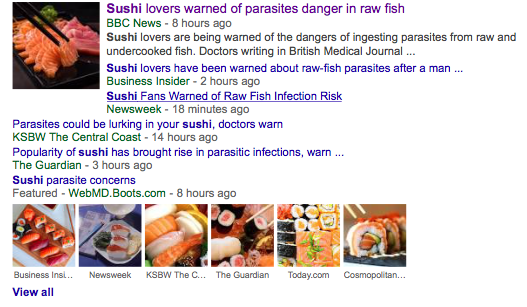
This shouldn’t have become a vendetta against sushi, though. Many of the stories warn that more might contract the parasite as sushi consumption increases in the West, but there was no science to support that statement. The only evidence provided by the paper itself was 27 cases of the disease that actually originated from a European cuisine: raw anchovies. And, as we wrote, only 1% of New York City’s food poisoning reports come from sushi.
Media outlets claim the universe shouldn’t exist
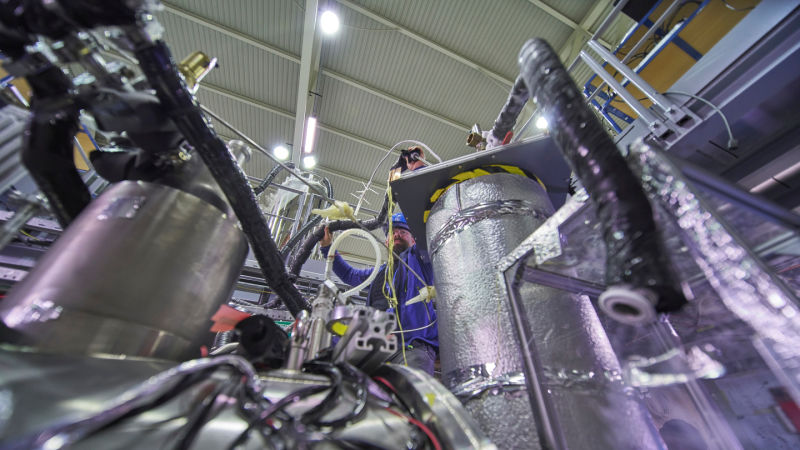
Image: CERN
Here’s thing about our universe: It already exists. It should exist, because it does exist. Why it exists, we have no idea. But back in October, a bunch of people claimed that scientists claimed the universe shouldn’t exist, which is not what really happened.
A week before this news came out, scientists made a pretty incredible and super-precise measurement of a property of the antiproton — the antimatter opposite of the proton, with the same mass, but opposite charge. The measurement of the antiproton was so exact that it was even more precise than the same value for the proton itself, which is pretty incredible if you think about it.
[referenced url=”https://gizmodo.com.au/2017/10/antimatter-property-beats-regular-matter-after-scientists-make-incredible-precision-measurement/” thumb=”https://i.kinja-img.com/gawker-media/image/upload/t_ku-large/mpmj8cykivk40tq7sodq.jpg” title=”Antimatter Property Beats Regular Matter After Scientists Make Incredible Precision Measurement ” excerpt=”If physics were complete as-is, the Universe wouldn’t exist. All particles would have found their antiparticle pairs and annihilated into a burst of energy. Matter and antimatter look like exact mirror images of one another, after all. There’s no difference between a particle and its antiparticle partner aside from having the reverse value of some of their intrinsic properties — they’re like mirror images.”]
A week later, a press release came out with the quote that “the universe should not actually exist.” Some outlets ran with that headline:
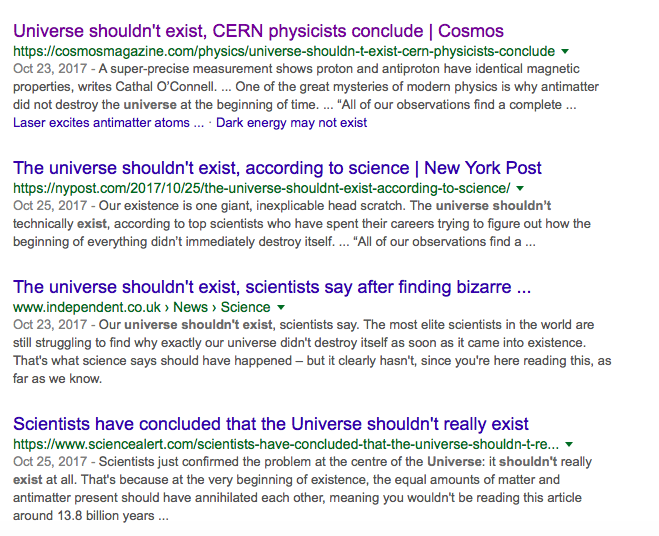
It’s true that researchers don’t know why there’s so much more matter than antimatter. But that’s old news. Also Physics Today wrote a story in which they said that basically everyone got the story wrong except for Gizmodo, which felt pretty good.
Cheese good, coconut oil bad – or something
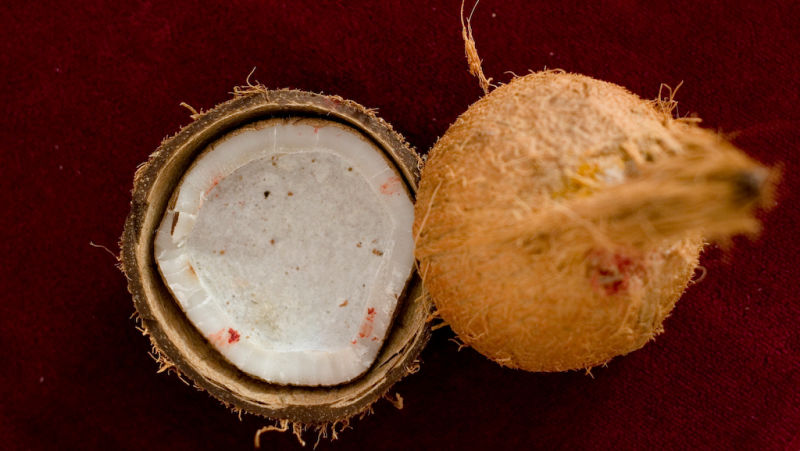
Image: Srinayan Puppala/Flickr
Nutrition studies are really hard to conduct objectively. At present, subjects usually just go about their lives and then scientists ask them structured questionnaires about what they have eaten. If they see any weird statistical oddities — places where it looks like a food caused something with an effect stronger than chance would — they report it. If they see a place where something they thought was unhealthy doesn’t make you sick, they also report it.
It’s really easy to turn these single results into news stories claiming that cheese is good for you, coffee will save your life, Nutella will give you cancer, or pretty much anything. But the truth is always far more nuanced. Take a recent study on cheese, which media outlets eagerly reported as claiming that cheese wouldn’t cause heart attacks or strokes.
Maybe that’s true, but maybe it’s not. The study was a meta analysis, or an examination of many past studies’ data pooled together, which is usually a good way to avoid being misled by a single outlier result. But many of the researchers received funding from the dairy industry, a fact that news outlets often left out. This is something crucial for a reader to know when weighing evidence. A newer meta analysis has found slight evidence that cheese could have some cardiovascular benefit, but this study hasn’t gotten nearly the same traction as the first.
Then there’s coconut oil. It’s fun to hate on popular health fads, so news outlets jumped all over an American Heart Association study on it. Essentially, the meta analysis showed that it can be beneficial to replace saturated fats with unsaturated fats to decrease heart disease risk. It included only a few studies on coconut oil in particular. However, coconut oil is a saturated fat, so they lumped it in with the rest. They did not link coconut oil to more cases of heart disease.
Some reporters went wild, excitedly claiming that coconut oil was as bad as beef fat or butter, whatever that means. That’s not really what the science says, though. If you want some coconut oil for your pie crust, that’s fine. Just don’t go eating the stuff like vanilla pudding.
Climate reporting still hard

Image: Wikimedia Commons
Climate change is real. Human actions are in part to blame. A lot of people write about it. A lot of people are mad about it. Some people don’t believe it’s happening, a group that presumably includes the president of the United States. But the reporting is often bad, wherever you look.
A study from May found a correlation that suggested climate change could account for three additional sleepless nights per hundred people per month, and lots of folks ran with it. But this study was based on a model, correlating data from two sets.
You should know that models are never 100% correct. You should also know that correlation does not imply that one thing immediately led to another. But the real problem? This kind of hyped-up story could distract folks from the more serious, more obvious effects of climate change.
But then another paper (again, a model) published in September found that the outlook might not be so bleak – we might be able to emit more carbon before increasing the planet’s temperatures to 1.5 degreed Celsius.
[referenced url=”https://gizmodo.com.au/2017/09/new-climate-study-doesnt-contradict-global-warming-no-matter-what-breitbart-says/” thumb=”https://i.kinja-img.com/gawker-media/image/upload/t_ku-large/sdfqdha3pfddortuivqw.jpg” title=”New Climate Study Doesn’t Contradict Global Warming, No Matter What Breitbart Says” excerpt=”The science news media has a pretty simple job. Find facts, and report them. Typically, this entails reading a scientific study, talking to the study’s authors and outside experts, writing, and fact-checking the confusing bits with experts again. But sometimes, the narrative the media wants isn’t actually supported by the study, or the experts. Such is the case with a new paper on climate change.”]
Places like Breitbart and the Daily Mail immediately claimed that climate scientists themselves were saying there is less reason to fear global warming. That is untrue — again, a new model came out. In this case, some scientists disagreed with it. And the scientists behind the research themselves tried to discredit the bad media reports, releasing a statement reaffirming that they felt we need to reduce greenhouse gas emissions.
Scientist completes head transplant on a corpse
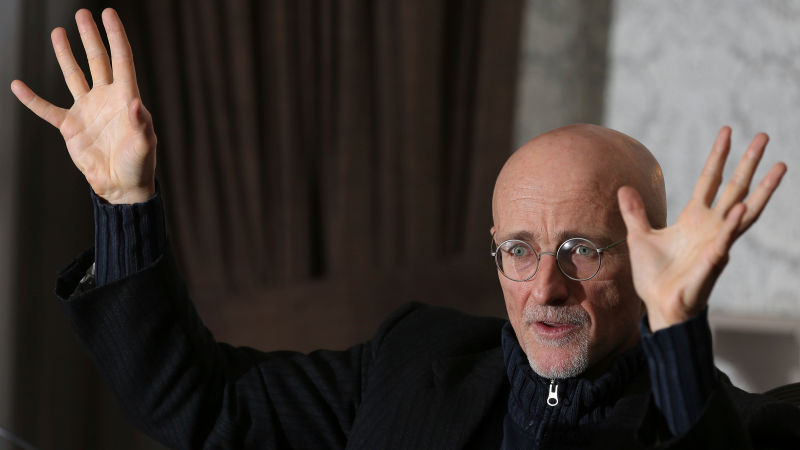
Image: AP
By now, you’ve probably heard of Sergio Canavero, the Italian doctor who plans to perform a human head transplant. If you read The Telegraph, you’d believe he already did. But the fine print was that the surgery was actually carried out on a corpse.
[referenced url=”https://gizmodo.com.au/2017/11/head-transplant-doctor-claims-first-successful-human-head-transplant-on-a-corpse/” thumb=”https://i.kinja-img.com/gawker-media/image/upload/t_ku-large/lw3zbtr5l8bgyvgnr3yv.jpg” title=”Head Transplant Doctor Claims First Successful Human Head Transplant… On A Corpse” excerpt=”One nice thing about teddy bears is that if your dog tears the head off of your child’s favourite one, you can just sew it back on. But you don’t proclaim your achievement a “wild success” — rather, you say, “Here, I have fixed your lifeless play-thing.”]
Many are watching Canavero closely. He’s already claimed to transplant rat and monkey heads with varying degrees of success. In the case of the rats, he didn’t say whether or not he fully severed the spinal cords. Canavero hasn’t been publishing nearly as much as one might expect for a scientist carrying out such a risky procedure. We’ll wait and see before getting as excited over swapping the heads of dead bodies.
News reports claim that “breatharians” survive on air alone
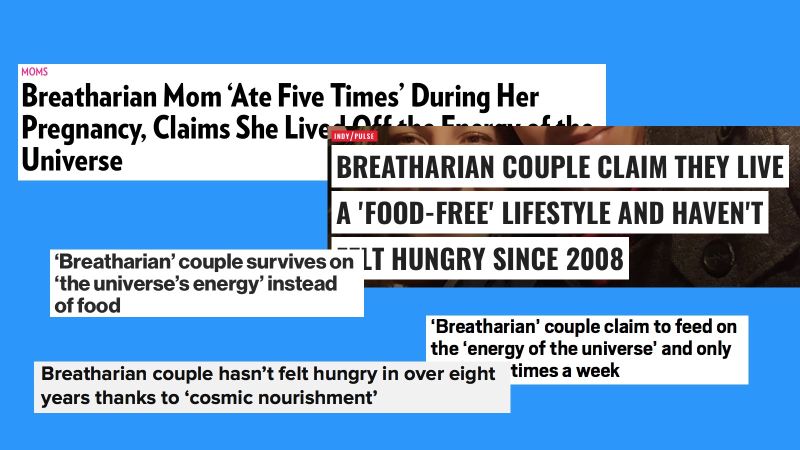
From our prior coverage:
A bunch of news outlets reported that a “breatharian” couple survives on air alone.
I’m not wasting my time debunking this shit.
I have nothing else to add except that, well, the fact that any person decided to write this story at all is a travesty.
